Molecular Devices UK Ltd offers 3D Ready™ Organoids in cryopreserved vials, an "off-the-shelf" solution for researchers looking to use physiologically appropriate, patient-derived organoid models without extensive culture procedures. These cryopreserved vials are integrated with a HUB Organoids license and made using the patented bioprocess technology, ensuring quality and reproducibility.
They include full protocols and thorough scientific support. The well-characterized, highly repeatable organoids allow researchers to test new treatments, predict patient responses in early-stage drug discovery, and produce robust results quickly and efficiently, all with a minimum initial investment of time and resources.
The new 3D Ready™ Organoids will allow users to:
- Achieve robust results
- Cell models that are well-characterized, highly repeatable, and physiologically relevant provide credibility to the results
- Save time and resources
- Assay-ready organoids provide an easier solution by eliminating the requirement for extensive cultivation and specialist knowledge
- Simplify proof of concept studies
- Efficiently explore the possibilities of organoids and begin using these strong cell models rapidly—without requiring a significant investment of time, experience, or resources
Leveraging our Organoid Expansion Service, our new 3D Ready Organoid vials offer unparalleled quality and standardization. Video Credit: Molecular Devices UK Ltd
Features
- Assay-ready convenience
- The organoids are conveniently packaged in frozen vials, making them ready for instant use whenever consumers require them
- Reproducible models
- By reducing variability and delivering consistent batch-to-batch results, organoids improve data quality, allowing users to acquire reliable and reproducible study results
- Outsourced expertise
- Save time and money by entrusting organoid production to a team of professionals who offer high-quality products while freeing up important internal resources
- Integrated license
- An integrated HUB Organoids license for approved proof-of-concept research shortens the time and cost of getting started using these potent cell models
- Technical support
- Each vial includes full procedures for use, as well as significant scientific assistance; even new users can get started with organoids quickly
Available organoids for proof-of-concept studies
Breast cancer organoids
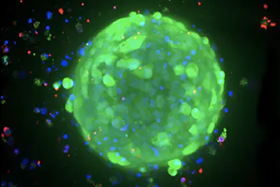
Image Credit: Molecular Devices UK Ltd
Clinically relevant tumor models are used to better understand the mechanism, examine tumor biomarkers, and test anticancer medicines.
Colorectal cancer (CRC) organoids
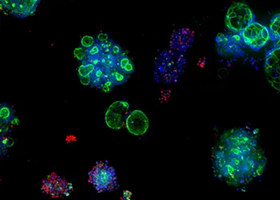
Image Credit: Molecular Devices UK Ltd
Ten CRC organoid (PDO) lines have been developed using adult stem cells from colorectal cancer patient biopsy tissue.
Intestinal organoids
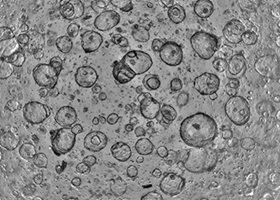
Image Credit: Molecular Devices UK Ltd
They are derived from biopsies of histologically normal duodenal mucosa and reproduce healthy intestinal epithelium.
3D ready organoid expansion services
Molecular Devices is a global leader in the scaling up and industrial manufacturing of human-derived 3D organoids. Our semi-automated approach uses our patent-pending bioprocess technology to create large quantities of standardized patient-derived organoids (PDOs) from customer-supplied organoid lines or patient-derived xenografts.
Following large-batch expansion, these bioprocess-grown organoids are cryopreserved and returned to customers as customized assay-ready vials.
Applications
- Breast Cancer Organoids
- Colorectal Cancer (CRC) Organoids
- Intestinal Organoids
- Patient-derived organoids (Tumoroids)
Breast cancer organoids
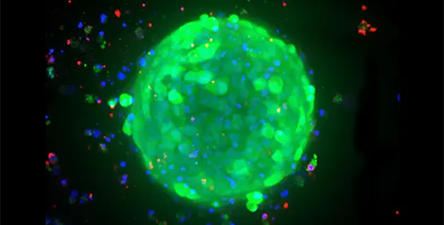
Image Credit: Molecular Devices UK Ltd
Breast cancer patients’ survival rates depend heavily on early identification and treatment. This involves the use of therapeutically relevant tumor models to better understand the mechanism, identify tumor biomarkers, and screen anticancer medicines. Breast cancer tumoroids provide a platform for investigating tumor physiology and response to targeted therapy.
Colorectal cancer (CRC) organoids
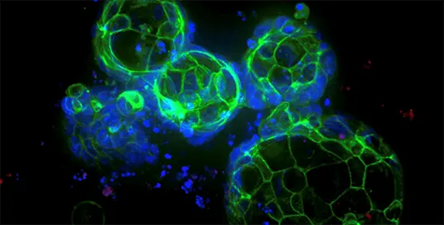
Image Credit: Molecular Devices UK Ltd
Patient-derived colorectal cancer organoids, also known as colorectal cancer PDOs or CRC organoids, are multicellular miniature versions of the three-dimensional tumor that are cultivated in a laboratory. It has been demonstrated that they exhibit drug responses comparable to those of their derived organoids and maintain the in vivo features of the original tumor. This presents revolutionary opportunities for drug discovery and medical research.
Intestinal organoids
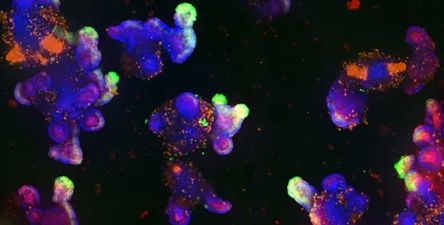
Image Credit: Molecular Devices UK Ltd
3D tissue models called intestinal organoids replicate the features of the intestinal lumen and the surrounding intestinal epithelium.
Intestinal organoids are valuable for researching intestinal cell biology, regeneration, differentiation, and disease phenotypes, including the effects of certain mutations, the microbiome, or the inflammation process, because of the cell composition and organization of the epithelium.
Patient-derived organoids (Tumoroids)
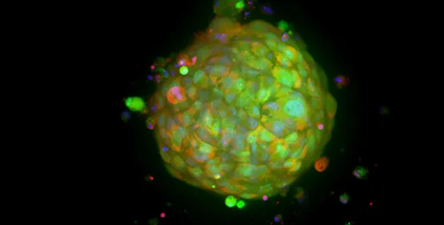
Image Credit: Molecular Devices UK Ltd
Cultures of tumor cells taken from specific patients are known as patient-derived tumor organoids or tumoroids. Patient-derived organoids (PDOs), which are produced from surgical procedures or tumor biopsies, can be used as models to study the proliferation of cancer cells and comprehend patient-specific treatment responses.
Digested tumor pieces and cells taken from patient-derived tumors have cancer stem cell (CSC)-like properties and can be grown over numerous passages to produce huge numbers of organoids with the molecular characteristics of the original tumor.